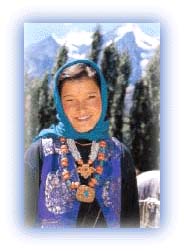Lahaul and Spiti
General Info
· Lahaul
· Baralacha Range
· Chandra Valley
· Bhaga Valley
· Keylong
· Chandra-Bhaga Valley
· Great Mountain Mass
· Lingti Plains
· Spiti
· Climate
· Kaza
· Pin Valley
Other Places of Interest
Passes
· Baralacha Pass
Rivers
· Chandra River
· Chandra - Bhaga
· Spiti River
Glaciers
· Bara Shigri Glacier
Lakes
· Chandratal Lake
· Suraj Tal Lake
People
Tradition & culture
· Spiti
Religion
Fairs and Festivals
History
· Lahaul
· Spiti
Visual Delights

![]()
|
Lahaulas The people of Lahaul or the Lahaulas are both Hindus and Buddhists, and their dialect resembles Tibetan. They have a close affinity with Ladakhis and Tibetans. |
 |
| A young Lahauli girl with the perfect backdrop Credit: Discover India |
The family is the basic unit of kinship amongst the Lahaulas. They usually follow an extended family system, an inheritance from the polyandry system of the past. The family is headed by a senior male member who may not always be the oldest male member or the seniormost living member of the family. The head is known as yunda and his wife yundamo. He usually attains automatic authority by virtue of his being the oldest member of the senior generation. However, in case of his not being able to discharge his functions suitably, the authority is transferred to another senior male member of the family. All senior members of the Lahaula family are highly respected by the others. Their advice is sought on all important matters concerning the family.
The next higher social structure amongst the Lahaulas is the clan. These are locally called rhus. A clan is a unit that divides the community in a valley or a group of villages into smaller groups that form the basis for close relationships. The clan is one of the main considerations for entering into marriages. Important clans of the Lahaulas are Chepapa, Langzipa, Darnapa, Lenchenpa, Khingopa, Mehrupa and Kisingpa.
Traditions and Culture
Marriages may not take place within a clan though there is
nothing to forbid a male from selecting his spouse from the
family of his mother's parents or from the family of his
father's sister. However, in recent times this system of cross-
cousin marriage is slowly dying out. There is also no taboo on
marrying within the same village provided the clans of the
partners differ.
Since castes are virtually absent among the Lahaulas, there is no sense of superiority or inferiority. Due to the cultural, linguistic and physical barriers between the different valleys of Lahaul, the people prefer to marry within their own valley. Communication between valleys is a problem for most of the year as the high passes, trails and roads remain blocked by snow.
Polyandry was prevalent till recent times in many valleys of Lahaul. However, with the advent of modern civilization in these areas, this practise is dying out. It had was evolved over the centuries due to many reasons. A polyandral society helped boost a poor socio-economy. It also helped further fragmentation of the unproductive and meagre agricultural holdings. It helped check population pressure. And finally, the harsh environmental and physical conditions also led to polyandry.
Divorce is not common in this community, though divorces do occur and are accomplished by a simple ceremony performed in the presence of village elders. Divorce can be sought by either partner. The husband has to pay compensation to his ex-wife if she does not remarry.
The main source of livelihood for the Lahaulas are agriculture and allied activities. Occupations include animal husbandry, daily wage earning as laborers in government programs, regular government service, business (mainly shopkeeping), crafts like weaving.
All rights reserved